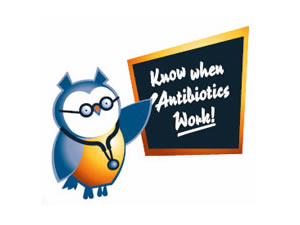Antibiotic resistance: Be responsible!
Posted on: 18-10-2006
When their child is sick, parents try to do everything they can to help, so they rush to give him antibiotics, but these are not always the right treatment for all illnesses; they can even be harmful sometimes. Taking antibiotics, when not needed, can cause some bacteria to become resistant and thus require a stronger treatment; not to mention that they can cause side effects.
What are antibiotics?
Antibiotics are drugs that work against infections caused by bacteria. They do not cure infections caused by viruses or other microorganisms.
What is bacterial resistance?
Usually, antibiotics kill bacteria or stop them from growing. However, some bacteria have become resistant to specific antibiotics. This means that they became stronger and harder to kill and therefore the specific antibiotic doesn't work against them. This requires the resistant bacteria to be treated with a different antibiotic, more potent, and that may have to be given intravenously (through a vein) in a hospital. Few kinds of resistant bacteria are untreatable.
What can we do to safeguard the effectiveness of antibiotic?
• Understand when antibiotic should be used: Don't expect the doctor to give antibiotic every time you child is sick. Antibiotics are effective in treating most bacterial infections but they are not useful against viral infections causing colds and flu.
• Give antibiotics exactly as prescribed: Follow the doctor's instructions when giving medications, including how many times a day and how long .Avoid stopping the treatment for your child few days earlier, if he starts feeling better- A complete course of antibiotic is needed to kill all the harmful bacteria. A shortened course of antibiotic, on the other hand, often wipes only the most vulnerable bacteria while allowing resistant bacteria to survive.
• Never give an Antibiotic without prescription: Do not give the leftover of medication the next time your child is sick, neither pass it along to someone else.
• Don't press your doctor to antibiotic if your child has a viral illness: many conditions can be treated supportively until the body overcomes the infection .For instance a nasal spray is enough to clean a stuffy nose, or a mixture of warm water, lemon and honey can temporarily soothe a sore throat.
• Protect your child from infection in the first place: you can keep many germs away by adopting preventive habits , such as washing hands thouroughly and often, handling and preparing food safely and keeping up –to date on immunizations.
When you abuse antibiotic, the resistant microorganism that you helped to create can become widely established causing new and hard to treat infections. That's why the decisions you make about antibiotic use extend far beyond your reach. It is a public health issue.
In Lebanon , people can buy antibiotics without a doctor's prescription and guidance. This practice entails many hazards: it may subject the child to the side effects of an unnecessary medication and it contributes to the public health problem discussed above. So this doubles our responsibility to be aware of the problem and to try as much as possible to avoid this pitfall.
Always be aware that the responsible use of antibiotics protects the health of your family, neighbors and the whole community!
| Go to Health Articles Archive

